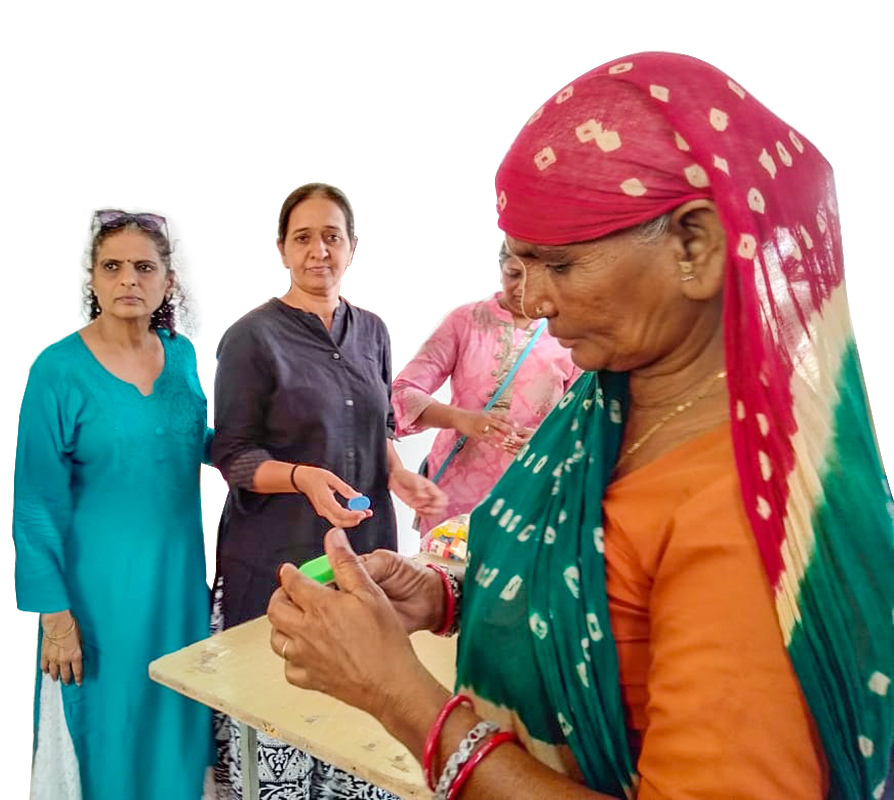The Rotary Club of Senoras, Jamnagar, RI District 3060, an all-women’s club as its name denotes, has seized upon the corona pandemic lockdown time to further work on its pet project of de-addiction from the extremely harmful gutka and other tobacco products.

Its charter president Dr Kalpana Khandheria says that counseling of youth and getting the community rid of addiction to harmful products has been on their club’s agenda right from “day 1 of our Rotary journey. And our club members felt this lockdown period was the best time to continue to work on de-addiction, as all the people addicted to harmful substances had to remain at home, away from friends and gatherings where substance abuse normally happens.”
They felt it would be easier to convince youngsters and other addicts to stay away from harmful substances “because first of all, they are in the midst of family members who will advise, motivate and support them to give up these bad habits. Also during the lockdown, gutka and other tobacco products’ availability had also come down.”

So the club started distributing a harmless and tasty substitute to gutka in the form of a Magic Mix Mukhwas, a mouth freshner containing cinnamon, cumin, ajwain (carom seeds), saunf (fennel), rice flour and cloves.
The story of the magic mukhwas goes back two years. Dr Kalpana recalls that she came across a social media post where she read about a doctor associated with Mumbai’s BEST buses “who had described that he had distributed packets of these to 300 of BEST’s conductors and drivers who were addicted to gutka and other tobacco products. I traced his number, talked to him and got the recipe of this mukhwas.”
During the lockdown, we thought it is the best time to push this initiative. People who wish to de-addict come to my hospital and take away two containers.
– Dr Kalpana Khandheria
A gynaecologist by profession, Dr Kalpana is also the President of the Jamnagar Cancer Research Institute and hence deeply interested in cancer prevention. “For the coming year our DGE Prashant Jani has given me the responsibility of District Chairperson of Mammography and Oral Cancer,” she adds.
After getting the recipe of this magic mix from the Mumbai doctor, she organised and distributed some 5,000 packets of this mukhwas, through her family Trust (Shree Batukbhai Khandheria Charitable Trust) to NGOs and others working in the area of cancer prevention and tobacco/substance abuse.

From the very first day of its Rotary journey in 2014, the Senoras have taken on Vyasan Mukti (de-addiction) and Yuva Counselling as their signature project. On the first day of its inception the club inaugurated a Yuva Counselling Centre at Dr Kalpana’s clinic.
President of the club Nisha Aiyer says that in the last six years, “we have counselled 55,997 students in 436 schools and colleges of Jamnagar and Devbhumi Dwarka districts and provided de-addiction medicines to over 5,000 workers of all industrial areas in these districts.” It has also organised a de-addiction drive taking on board all religious leaders. In partnership with the Kanoria hospital in Ahmadabad, which has an indoor de-addiction facility to admit patients, the club arranged training of trainers by chest physician Dr Dabavala, and distributed the mukhwas packets to NGOs.
Dr Kalpana adds that this is an ongoing signature project of their club and the Senoras are now very keen to have other Rotary clubs replicate it. Each pouch/dabbi of the mix costs barely ₹15–20, it is easy to make at home and its recipe is given on the container so that the recipient can start making it at home. “During the lockdown, we thought it is the best time to push this initiative and we have started distributing this magic mix. People who wish to de-addict come to my hospital, take away two containers and then they can prepare it at home.”

On advice from DG Anish Shah, she has written to other clubs urging them to replicate this project, which is not only good for the community’s health, prevention of cancer and other diseases but also good PR for Rotary. It can be easily replicated and is rather inexpensive — 100 pouches can be made spending just ₹1,500–2,000, she adds.
The clubs can “distribute these either to individuals who wish to de-addict, or keep some pouches at medical stores, a few of which can be distributed free, after which the interested person should start making it at home, as she frowns on “spoon feeding”!
“By just spending less than ₹2,000, we can reach this mix to so many people,” she adds.
To prepare 100 pouches, one needs to take 250 grams of each of the ingredients — cinnamon, cumin, ajwain (carom seeds), saunf (fennel), rice flour and 50 cloves, and churn them in a grinder.





